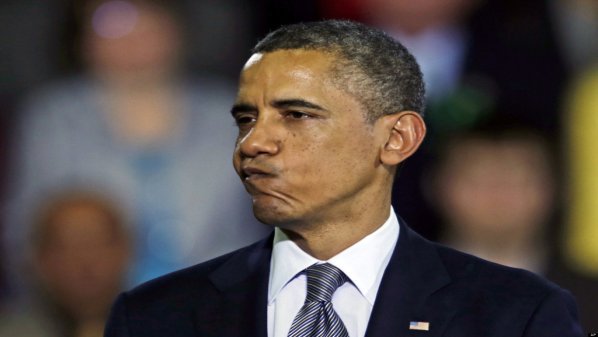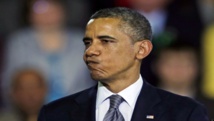The surge in fighting and stalled peace talks in Geneva have dimmed hopes that the ceasefire would lay the groundwork for finally resolving Syria's devastating five-year conflict.
On Sunday, Obama said he had spoken to his Russian counterpart -- a key Assad ally -- to try to shore up the truce.
"I spoke to President Vladimir Putin early last week to try to make sure that we could reinstate the cessation of hostilities," he told reporters in Germany.
The president was Monday set to announce plans to send up to 250 more military trainers to Syria, intensifying US assistance to rebels, a senior administration official said.
An EU spokesperson also issued a statement urging the US and Russia as brokers of the ceasefire "to bring the maximum influence to bear in order to end these breaches of the agreement".
After at least 27 civilian deaths were reported in regime bombardments across Syria on Saturday, a fresh barrage of air strikes hit Aleppo on Sunday.
Twelve civilians died when a strike hit an open-air fruit and vegetable market, the Syrian Observatory for Human Rights monitoring group said.
An AFP photographer saw a man in a bright-blue cap carrying a shell-shocked, bleeding and barefoot young boy.
- 'Attack on Geneva process' -
The Observatory said four more civilians died Sunday in strikes on other opposition neighbourhoods, and in Aleppo's western government-held parts, 10 civilians including a woman and two children were killed by rebel rocket fire.
Emergency responders, known as White Helmets, told AFP they were "exhausted" by the past three days of bombing in Syria's second city.
"We're back to working 24-hour shifts after we started working shorter hours because of the truce," one volunteer said.
Also Sunday, rockets fired into Turkey from an area of Syria controlled by the Islamic State group killed one person and wounded 26, Ankara's deputy prime minister said. The wounded included six Syrians.
While officials have yet to declare the ceasefire dead, Observatory head Rami Abdel Rahman said the escalating violence in Aleppo and elsewhere meant it had effectively collapsed.
Peace negotiations due to run in Geneva until Wednesday have faltered after Syria's main opposition group last week suspended its official participation in the talks.
The High Negotiations Committee walked away in frustration at the devastating humanitarian situation on the ground.
"The Assad regime's bombing offensive is not only a brutal attack on Syrians, but an attack on the Geneva process that is the only possible pathway to peace," HNC spokesman Salem al-Meslet said Sunday in an emailed statement.
The truce was part of the biggest diplomatic push yet to resolve Syria's conflict, which began in March 2011 with widespread anti-Assad protests.
It has since spiralled into a multi-front war that has killed 270,000 people and drawn in regional and world powers.
- Ground troops 'a mistake' -
In an interview with the BBC aired Sunday, Obama warned Western governments should not send troops to topple Assad's regime.
"Syria has been a heartbreaking situation of enormous complexity, and I don't think there are any simple solutions," he said in London.
"It would be a mistake for the United States, or Great Britain, or a combination of Western states to send in ground troops and overthrow the Assad regime."
He urged all parties "to sit down at the table and try to broker a transition".
Obama first urged Assad to step down in August 2011 but has resisted calls by critics to use American military force to end the Syrian regime's rule.
Washington did, however, launch air strikes in mid-2014 against the Islamic State group after it seized large parts of Syria and neighbouring Iraq.
-------------------------------------------------------------------------------------------------------------------------
On Sunday, Obama said he had spoken to his Russian counterpart -- a key Assad ally -- to try to shore up the truce.
"I spoke to President Vladimir Putin early last week to try to make sure that we could reinstate the cessation of hostilities," he told reporters in Germany.
The president was Monday set to announce plans to send up to 250 more military trainers to Syria, intensifying US assistance to rebels, a senior administration official said.
An EU spokesperson also issued a statement urging the US and Russia as brokers of the ceasefire "to bring the maximum influence to bear in order to end these breaches of the agreement".
After at least 27 civilian deaths were reported in regime bombardments across Syria on Saturday, a fresh barrage of air strikes hit Aleppo on Sunday.
Twelve civilians died when a strike hit an open-air fruit and vegetable market, the Syrian Observatory for Human Rights monitoring group said.
An AFP photographer saw a man in a bright-blue cap carrying a shell-shocked, bleeding and barefoot young boy.
- 'Attack on Geneva process' -
The Observatory said four more civilians died Sunday in strikes on other opposition neighbourhoods, and in Aleppo's western government-held parts, 10 civilians including a woman and two children were killed by rebel rocket fire.
Emergency responders, known as White Helmets, told AFP they were "exhausted" by the past three days of bombing in Syria's second city.
"We're back to working 24-hour shifts after we started working shorter hours because of the truce," one volunteer said.
Also Sunday, rockets fired into Turkey from an area of Syria controlled by the Islamic State group killed one person and wounded 26, Ankara's deputy prime minister said. The wounded included six Syrians.
While officials have yet to declare the ceasefire dead, Observatory head Rami Abdel Rahman said the escalating violence in Aleppo and elsewhere meant it had effectively collapsed.
Peace negotiations due to run in Geneva until Wednesday have faltered after Syria's main opposition group last week suspended its official participation in the talks.
The High Negotiations Committee walked away in frustration at the devastating humanitarian situation on the ground.
"The Assad regime's bombing offensive is not only a brutal attack on Syrians, but an attack on the Geneva process that is the only possible pathway to peace," HNC spokesman Salem al-Meslet said Sunday in an emailed statement.
The truce was part of the biggest diplomatic push yet to resolve Syria's conflict, which began in March 2011 with widespread anti-Assad protests.
It has since spiralled into a multi-front war that has killed 270,000 people and drawn in regional and world powers.
- Ground troops 'a mistake' -
In an interview with the BBC aired Sunday, Obama warned Western governments should not send troops to topple Assad's regime.
"Syria has been a heartbreaking situation of enormous complexity, and I don't think there are any simple solutions," he said in London.
"It would be a mistake for the United States, or Great Britain, or a combination of Western states to send in ground troops and overthrow the Assad regime."
He urged all parties "to sit down at the table and try to broker a transition".
Obama first urged Assad to step down in August 2011 but has resisted calls by critics to use American military force to end the Syrian regime's rule.
Washington did, however, launch air strikes in mid-2014 against the Islamic State group after it seized large parts of Syria and neighbouring Iraq.
-------------------------------------------------------------------------------------------------------------------------









 Home
Home Politics
Politics











